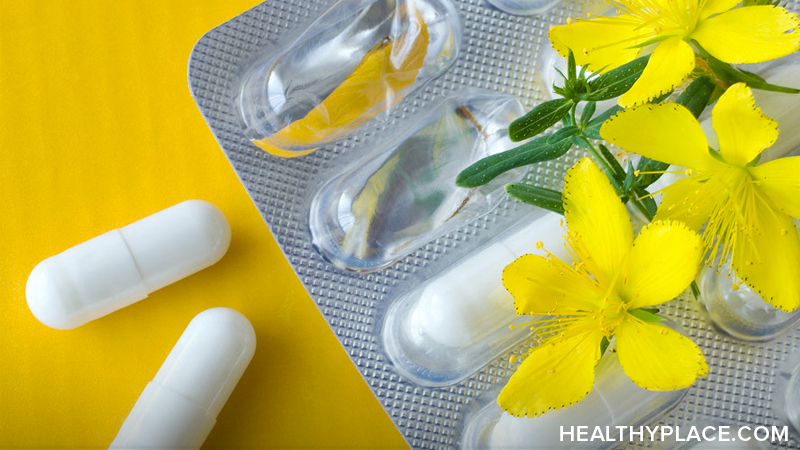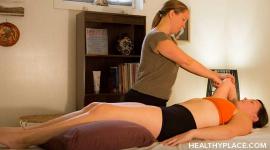St. John's Wort For Treatment of Depression

Detailed information on St. John's Wort, an alternative herbal treatment for depression, including dangerous interactions between St. John's Wort and certain medications.
Contents
Introduction
The National Center for Complementary and Alternative Medicine (NCCAM) has developed this fact sheet on the use of St. John's wort for depression. It is part of a series intended to help consumers make informed decisions about whether to use complementary and alternative medicine (CAM) for a disease or medical condition. NCCAM defines CAM as approaches to health care that are not currently part of conventional medicine as practiced in the United States.a
Key Points
-
St. John's wort is an herb that has been used for centuries for medicinal purposes, including to treat depression.
-
The composition of St. John's wort and how it might work are not well understood.
-
There is some scientific evidence that St. John's wort is useful for treating mild to moderate depression. However, recent studies suggest that St. John's wort is of no benefit in treating major depression of moderate severity. More research is required to help us know whether St. John's wort has value in treating other forms of depression.
St. John's wort interacts with certain drugs, and these interactions can be dangerous.
-
It is important to inform all of your health care providers about any therapy that you are currently using or considering, including any dietary supplements. This is to help ensure a safe and coordinated course of care.
a Conventional medicine is medicine as practiced by holders of M.D. (medical doctor) or D.O. (doctor of osteopathy) degrees and by their allied health professionals, such as physical therapists, psychologists, and registered nurses. To find out more, see the NCCAM fact sheet "What Is Complementary and Alternative Medicine?"
Frequently Asked Questions
1. What is St. John's wort?
St. John's wort (Hypericum perforatum in Latin) is a long-living plant with yellow flowers. It contains many chemical compounds. Some are believed to be the active ingredients that produce the herb's effects, including the compounds hypericin and hyperforin.
How these compounds actually work in the body is not yet known, but several theories have been suggested. Preliminary studies suggest that St. John's wort might work by preventing nerve cells in the brain from reabsorbing the chemical messenger serotonin, or by reducing levels of a protein involved in the body's immune system functioning.
2. For what medicinal purposes has St. John's wort been used?
St. John's wort has been used for centuries to treat mental disorders as well as nerve pain. In ancient times, doctors and herbalists (specialists in herbs) wrote about its use as a sedative and treatment for malaria as well as a balm for wounds, burns, and insect bites. Today, St. John's wort is used by some people to treat mild to moderate depression, anxiety, or sleep disorders.
3. What is depression?
Information on depression is available from the National Institute of Mental Health. Here is a brief overview.
Depression is a medical condition that affects nearly 19 million Americans each year. A person's mood, thoughts, physical health, and behavior all may be affected. Symptoms commonly include:
- Ongoing sad mood
- Loss of interest or pleasure in activities that the person once enjoyed
- Significant change in appetite or weight
- Oversleeping or difficulty sleeping
- Agitation or unusual slowness
- Loss of energy
- Feelings of worthlessness or guilt
- Difficulty "thinking," such as concentrating or making decisions
- Recurrent thoughts of death or suicide
Depressive illness comes in different forms. The three major forms are described below. Each can vary from person to person in terms of symptoms experienced and the severity of depression.
-
In major depression, people experience a sad mood or loss of interest or pleasure in activities for at least 2 weeks. In addition, they have at least four other symptoms of depression. Major depression can be mild, moderate, or severe. If it is not treated, it can last for 6 months or more.
-
In minor depression, people experience the same symptoms as major depression, but they are fewer in number and are less disabling. Symptoms last at least 6 months but less than 2 years continuously.
-
In dysthymia, a milder, but more chronic form of depression, people experience a depressed mood for at least 2 years (1 year for children) accompanied by at least two other symptoms of depression.
-
In bipolar disorder, also called manic depression, a person has periods of depressive symptoms that alternate with periods of mania. Symptoms of mania include an abnormally high level of excitement and energy, racing thoughts, and behavior that is impulsive and inappropriate.
Some people still hold outdated beliefs about depression--for example, that the emotional symptoms caused by depression are "not real" and that a person can merely "will" himself out of it. Depression is a real medical condition. It can be treated effectively with conventional medicine, including by antidepressant drugs and certain types of psychotherapy (talk therapy).
4. Why is St. John's wort used as an alternative therapy for depression?
Some patients who take antidepressant drugs do not experience relief from their depression. Other patients have reported unpleasant side effects from their prescription medication, such as a dry mouth, nausea, headache, or effects on sexual function or sleep.
Sometimes people turn to herbal preparations like St. John's wort because they believe "natural" products are better for them than prescription medications, or that natural products are always safe. Neither of these statements is true (this is discussed further below).
Finally, cost can be a reason. St. John's wort costs less than many antidepressant medications, and it is sold without a prescription (over the counter).
5. How widely is St. John's wort used for treating depression?
In Europe, St. John's wort is widely prescribed for depression. In the United States, St. John's wort is not a prescription medication, but there is considerable public interest in it. St. John's wort remains among the top-selling herbal products in the United States.
6. How is St. John's wort sold?
St. John's wort products are sold in the following forms:
- Capsules
- Teas--the dried herb is added to boiling water and steeped for a period of time.
- Extracts--specific types of chemicals are removed from the herb, leaving the desired chemicals in a concentrated form.
7. Does St. John's wort work as a treatment for depression?
There has been scientific research to try to answer this question.
In Europe, results from a number of scientific studies have supported the effectiveness of certain St. John's wort extracts for depression. An overview of 23 clinical studies found that the herb might be useful in cases of mild to moderate depression. The studies, which included 1,757 outpatients, reported that St. John's wort was more effective than a placebo (here, a "dummy" pill designed to have no effect) and appeared to produce fewer side effects than some standard antidepressants (Linde et al. British Medical Journal, 1996).
Other studies conducted recently have found no benefit from the use of St. John's wort for certain types of depression. For example, the results of a study funded by Pfizer Inc., a pharmaceutical company, found that St. John's wort, when compared with placebo, was not effective for treating major depression (Shelton et al. JAMA, 2001).
In addition, several components of the National Institutes of Health (NIH)--NCCAM, the Office of Dietary Supplements (ODS), and the National Institute of Mental Health (NIMH)--funded a large, carefully designed research study to find out whether St. John's wort extract benefits people with major depression of moderate severity. This clinical trial (a research study in people) found that St. John's wort was no more effective for treating major depression of moderate severity than placebo (Hypericum Depression Trial Study Group. JAMA, 2002; for further information, view the press release online at nccam.nih.gov/news/2002 or contact the NCCAM Clearinghouse).
8. Are there any risks to taking St. John's wort for depression?
Yes, there are risks in taking St. John's wort for depression.
Many so-called "natural" substances can have harmful effects--especially if they are taken in too large a quantity or if they interact with something else the person is taking.
Research from NIH has shown that St. John's wort interacts with some drugs--including certain drugs used to control HIV infection (such as indinavir). Other research shows that St. John's wort can interact with chemotherapeutic, or anticancer, drugs (such as irinotecan). The herb may also interact with drugs that help prevent the body from rejecting transplanted organs (such as cyclosporine). Using St. John's wort limits these drugs' effectiveness.
Also, St. John's wort is not a proven therapy for depression. If depression is not adequately treated, it can become severe and, in some cases, may be associated with suicide. Consult a health care practitioner if you or someone you care about may be experiencing depression.
People can experience side effects from taking St. John's wort. The most common side effects include dry mouth, dizziness, diarrhea, nausea, increased sensitivity to sunlight, and fatigue.
9. What are some other possible problems with using St. John's wort?
Herbal products such as St. John's wort are classified as dietary supplements by the U.S. Food and Drug Administration (FDA), a regulatory agency of the Federal Government. The FDA's requirements for testing and obtaining approval to sell dietary supplements are less strict than its requirements for drugs. Unlike drugs, herbal products can be sold without requiring studies on dosage, safety, or effectiveness. For more information, see the NCCAM fact sheet "What's in the Bottle? An Introduction to Dietary Supplements."
The strength and quality of herbal products are often unpredictable. Products can differ in content not only from brand to brand, but from batch to batch. Information on labels may be misleading or inaccurate. For more information on safety issues, see the NCCAM fact sheet "Herbal Supplements: Consider Safety, Too."
10. Is NCCAM funding research on St. John's wort, including for depression and other mental illnesses?
Yes. For example, recent projects supported by NCCAM include:
-
Safety and effectiveness of St. John's wort for the treatment of minor depression
-
Safety of St. John's wort for the treatment of social phobia
-
Effectiveness of St. John's wort for the treatment of obsessive compulsive disorder
-
Effects of St. John's wort on how well birth control pills work
-
Possible adverse interactions of St. John's wort and narcotic pain medications
For More Information
NCCAM Clearinghouse
Toll-free in the U.S.: 1-888-644-6226
International: 301-519-3153
TTY (for deaf or hard-of-hearing callers): 1-866-464-3615
E-mail: info@nccam.nih.gov
Web site: http://nccam.nih.gov
Address: NCCAM Clearinghouse,
P.O. Box 7923, Gaithersburg, MD 20898-7923
Fax: 1-866-464-3616 Fax-on-Demand service: 1-888-644-6226
The NCCAM Clearinghouse provides information about CAM and about NCCAM. Services include fact sheets, other publications, and searches of Federal databases of scientific and medical literature. The Clearinghouse does not provide medical advice, treatment recommendations, or referrals to practitioners.
CAM on PubMed
Web site: www.nlm.nih.gov/nccam/camonpubmed.html
CAM on PubMed, a database on the Internet developed jointly by NCCAM and the National Library of Medicine, offers citations to (and in most cases, brief summaries of) articles on CAM in scientifically based, peer-reviewed journals. CAM on PubMed also links to many publisher Web sites, which may offer the full text of articles.
National Institute of Mental Health (NIMH)
Web site: www.nimh.nih.gov
Toll-free: 1-800-421-4211
E-mail: nimhinfo@nih.gov
Address: 6001 Executive Blvd., Rm. 8184,
MSC 9663, Bethesda, MD 20892-9663
NIMH is committed to reducing the burden of mental illness through research on mental disorders and the underlying basic science of brain and behavior. NIMH provides publications on depression and other illnesses.
Office of Dietary Supplements (ODS), NIH
Web site: http://ods.od.nih.gov
Address: 6100 Executive Blvd.,
Bethesda, MD 20892-7517
ODS, whose mission is to explore the potential role of dietary supplements to improve health care, promotes the scientific study of dietary supplements through conducting and coordinating scientific research and compiling and disseminating research results. Its public information is offered via its Web site only.
ClinicalTrials.gov
Web site: http://clinicaltrials.gov
ClinicalTrials.gov provides patients, family members, health care professionals, and members of the public access to information on clinical trials, primarily in the United States and Canada, for a wide range of diseases and conditions. It is sponsored by NIH and the FDA.
Computer Retrieval of Information on Scientific Projects (CRISP)
Web site: http://crisp.cit.nih.gov
CRISP is a searchable database of federally funded (including by NIH) biomedical research projects conducted at universities, hospitals, and other research institutions.
Selected Sources
American Herbal Pharmacopoeia and Therapeutic Compendium. St. John's wort (Hypericum perforatum) Monograph. Herbalgram: The Journal of the American Botanical Council and the Herb Research Foundation. 1997;s (40):1-16.
American Psychiatric Association. Diagnostic and Statistical Manual of Mental Disorders, Fourth Edition (DSM-IV), Washington, DC: American Psychiatric Association, 1994.
National Institute of Mental Health. Fact Sheets on Depression--"The Invisible Disease: Depression," "Depression Research at the National Institute of Mental Health," and "The Numbers Count: Mental Disorders in America," available online at www.nimh.nih.gov or see "For More Information" above.
Hypericum Depression Trial Study Group. "Effect of Hypericum perforatum (St. John's wort) in major depressive disorder: A Randomized, Controlled Trial". Journal of the American Medical Association. 2002; 287:1807-14.
Shelton RC, Keller MB, Gelenberg AJ, et al. Effectiveness of St. John's wort in major depression. Journal of the American Medical Association. 2001; 285:1978-86.
Linde K, et al. St. John's wort for depression--An Overview and Meta-analysis of Randomized Clinical Trials. British Medical Journal. 1996; 313:253-8.
Piscitelli SC, et al. Indinavir concentrations and St. John's wort. The Lancet. 2000; 355:547-8.
Mathijssen RHJ, et al. Effects of St. John's wort on irinotecan metabolism. Journal of the National Cancer Institute. 2002; 94:1247-9.
NCCAM has provided this material for your information. It is not intended to substitute for the medical expertise and advice of your primary health care provider. We encourage you to discuss any decisions about treatment or care with your health care provider. The mention of any product, service, or therapy in this information is not an endorsement by NCCAM.
back to: Alternative Medicine Home ~ Alternative Medicine Treatments
APA Reference
Staff, H.
(2008, November 19). St. John's Wort For Treatment of Depression, HealthyPlace. Retrieved
on 2025, December 20 from https://www.healthyplace.com/alternative-mental-health/treatments/st-johns-wort-for-treatment-of-depression

